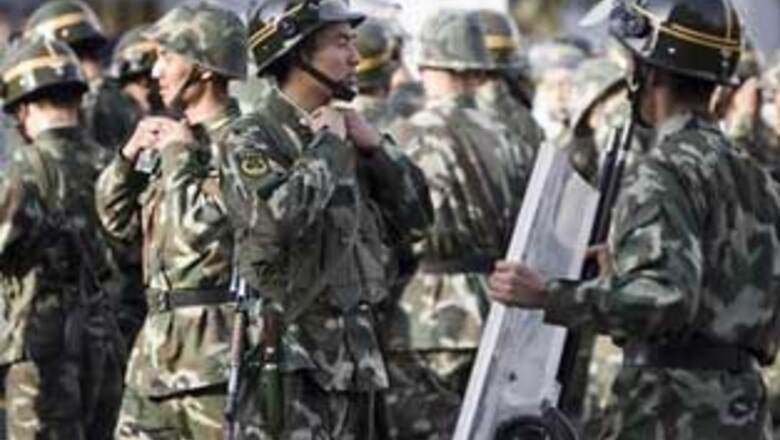
views
Urumqi (China): Five people died in unrest this week in the far-west Chinese city of Urumqi, its deputy mayor said on Friday, after a third day of protests which were broken up by police using tear gas.
Han Chinese protesters massed in the capital of the Xinjiang region, angry at authorities they blamed for failing to control a spate of syringe attacks and being slow to bring to trial ethnic Uighurs charged with deadly rioting on July 5.
The demonstrations are a rare direct challenge to the government by middle class urbanites, and could inflame ethnic resentments as Beijing prepares to showcase the nation's achievements on October 1, the 60th anniversary of Communist rule.
Troops blocked protesters' access to neighbourhoods that are home to Uighurs, a Turkic-speaking Muslim people native to the energy-rich region.
Faced with deteriorating support among the majority Han Chinese, Beijing dispatched public security minister Meng Jianzhu to Urumqi, where he urged officials to "restore social order as soon as possible".
The unrest came two months after deadly ethnic riots swept the city, killing at least 197 people, most of them Han Chinese.
The July 5 riots began after police stopped Uighurs demonstrating against the deaths of Uighur factory workers attacked by Han co-workers in southern China in late June.
Among the five who died on Thursday, two were "innocent civilians", while police were still investigating the other deaths, Deputy Mayor Zhang Hong told a news conference.
However, he did not specify the ethnic backgrounds of the dead nor how they died.
On Thursday, thousands of Han Chinese demanded the resignation of the region's powerful Communist Party secretary, Wang Lequan, who has held the post for 14 years.
Friday's evening television news showed Wang grimly taking notes at a meeting held by public security minister Meng.
Meng repeated government accusations that separatists, trying to stir up instability, were behind the syringe attacks.
"Maintaining stability is the central task of overriding importance in Xinjiang at the present time," he said.
Twenty-one Uighurs had been detained for the syringe attacks, Zhang said, adding that four have already been indicted. Most of the victims were Han Chinese, he added, but other ethnicities were also attacked.
PAGE_BREAK
Syringe attack warnngs
Alarm spread after government text messages a week ago warned of attacks with syringes. Some parents were afraid to send their children to schools which opened earlier in the week.
In one protest, a group of young Han Chinese men unfurled a Chinese flag and tried to lead a march to the central People's Square shouting "safety".
Police snatched away the flag, but people returned later to march with some of the red propaganda banners that festoon the city.
Angry crowds confronted paramilitary troops and police at intersections, demanding "more rights for Han people".
"These Uighurs have been stabbing us with needles," said a man trying to push through barriers sealing off a Uighur neighbourhood. "We need to take care of the problem."
For Uighurs, the crowds were a frightening reminder of attacks on their neighbourhoods on July 7 when Han Chinese demanding revenge for the riots two days earlier.
Uighurs said many young men have been detained without cause since July.
"There have been many Uighurs beaten up," said a Uighur woman who paused on her way to work to watch the crowds.
"If you just brush against someone, they might think that you tried to stab them."
Xinjiang's population is divided mainly between Uighurs, long the region's majority group, and Han Chinese, many of whom moved there in recent decades and who now make up about half the population. Most Urumqi residents are Han.
"I think the government has been way too lax towards the Uighurs," said a Han shop owner who identified himself as Zhang.
"This policy has got to change. We shouldn't have all these minorities. We should only have one Chinese ethnicity."
China says Uighurs campaigning for independence are allied with Islamist militants in the region. Deadly bomb attacks have occasionally hit government targets in Xinjiang.
The Xinjiang government, apparently trying to calm tempers, announced on Thursday that 196 suspects have been charged over the July riot. Fifty-one were indicted and will face prosecution.
Urumqi hospitals are treating 531 victims of syringe stabbings, the Xinhua news agency said, with 106 of them "showing obvious signs of needle attacks".
Rumours of AIDS patients attacking people with hypodermic needles have previously rattled parts of China, but were later shown to be unfounded.




















Comments
0 comment